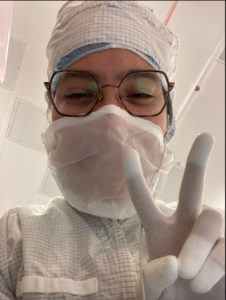Meet a MSE Graduate – Inês
Inês graduated with a MEng in Materials Science and Engineering from Imperial College London
What is your current job?
I currently work as a heat and mass transfer engineer at ASML San Diego. ASML is a Dutch company based in Veldhoven, NL, with several offices all around the world. The San Diego office is responsible for the development of the light sources of ASML’s lithography machines.
What do you do in your job?
I work on EUV (Extreme Ultra-Violet) light sources for the most advanced lithography machines that ASML produces. Specifically, I work in tin management: the light needed to achieve the EUV wavelengths is produced by aiming a powerful laser at minuscule droplets of tin to create a plasma. So, how do we ensure that only the light is transmitted to the rest of the machine and that the tin plasma, vapour and debris are properly disposed of? That’s where my team comes in!
What A-Levels (or equivalent) did you do?
I did the French Scientific Baccalaureate, with Physics, Chemistry and Maths as my primary subjects. However, something which is quite different from the British A-Levels, and that I’m really grateful for in hindsight, was the opportunity to keep studying History, Geography, Literature and Languages. This has helped me so much with my transferrable skills: written and spoken communication, note-taking, work and thought structure for example. I absolutely recommend taking Horizons courses during your time at Imperial!
Why you chose a career in Materials Science and Engineering (MSE)?
I first became interested in Materials Science and Engineering because I wanted to understand what makes certain things more fragile than others or more susceptible to breaking and failure! This is only the smallest part of Materials Science and Engineering, as I would discover during my time at Imperial.
Working in the semiconductors industry is very rewarding and, honestly, sometimes a little surreal. I work at one of the most important companies in the chipmaking supply chain, a little old me with my materials degree! It’s incredible technology, and my coworkers and incredibly smart, but beyond even the doors of our company, the kind of innovation supported by newer, more advanced microchips like the ones ASML helps to manufacture is, simply put, very cool.
What did you enjoy most about your MSE course?
I really enjoyed the practical aspect of the MSE course. It’s taught me how to handle laboratory and cleanroom work very well and manage all the unexpected problems that come with hands-on work. It wasn’t always easy, and there were a lot of failed experiments in undergrad, but certainly where I gained the most from.
What is the coolest thing you have done in your career so far?
I have to say moving to California is pretty amazing. I’m so grateful to work at such an international company and to be able to experience a different work culture, a highly specialised team of engineers coming together to push the edges of engineering and physics. And then I can go surfing afterwards! I can hardly believe it myself.
From a technical standpoint, the coolest thing I’ve done so far is contributing to the development and production of the first high-NA EUV light source, which is currently at Intel’s Oregon Factory.
What is your favourite material (and why)?
Bronze. Firstly, there’s an entire era of humanity named the Bronze Age! As someone who works with tin and works with the consequences of tin reacting with other materials, I always find satisfaction in knowing that at least we’ve conquered bronze.
What advice would you give your 16-year-old self?
Be a jack of all trades! Materials Science and Engineering is one of the most interdisciplinary degrees you can pursue at Imperial. It’s at the crossroads of all sciences and engineering, bringing together a diverse group of minds, skills and ideas!
At work, I feel that it has helped me so much to connect and learn from all of my colleagues, to correlate concepts which may have seemed disconnected from each other, and to find different ways to look at problems. Beyond the technical skills, take pride in your hobbies and your passions, and the skills you learn while playing sports, music, or video games while performing on stage or taking a photography class: what are you learning there that can make you a better engineer?


